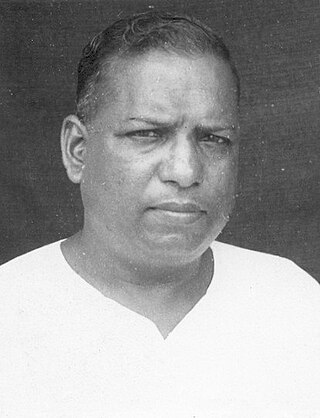Related Research Articles

The Rajya Sabha,constitutionally the Council of States,is the upper house of the bicameral Parliament of India. As of 2023,it has a maximum membership of 250,of which 238 are elected by the legislatures of the states and union territories using single transferable votes through open ballots,while the president can appoint 12 members for their contributions to art,literature,science,and social service. The total allowed capacity is 250 according to article 80 of the Indian Constitution. The current potential seating capacity of the Rajya Sabha is 245,after the Jammu and Kashmir (Reorganisation) Act,2019,the seats came down to 245. The maximum seats of 250 members can be filled up at the discretion and requirements of the house of Rajya Sabha.

The Lok Sabha,constitutionally the House of the People,is the lower house of India's bicameral Parliament,with the upper house being the Rajya Sabha. Members of the Lok Sabha are elected by an adult universal suffrage and a first-past-the-post system to represent their respective constituencies,and they hold their seats for five years or until the body is dissolved by the President on the advice of the council of ministers. The house meets in the Lok Sabha Chambers of the Parliament House,New Delhi.

The Parliament of India is the supreme legislative body of the Republic of India. It is a bicameral legislature composed of the Rajya Sabha and the Lok Sabha. The President of India,in their role as head of the legislature,has full powers to summon and prorogue either house of Parliament or to dissolve the Lok Sabha,but they can exercise these powers only upon the advice of the Prime Minister and their Union Council of Ministers.

The 13th Lok Sabha is the thirteenth session of the Lok Sabha. It was convened after 1999 Indian general election held during September–October 1999.

The 11th Lok Sabha was constituted after April–May 1996 general elections. The result of the election was a hung parliament,which would see three Prime Ministers in two years and force the country back to the polls in 1998. Atal Bihari Vajpayee of Bharatiya Janata Party,the single largest party to win this election,winning 67 more seats than previous 10th Lok Sabha,formed the government which lasted for only 13 days.
Basanta Kumar Das was an Indian Politician belonging to the Indian National Congress. He was elected to the Lok Sabha,the Lower house of Indian Parliament from Contai constituency,West Bengal in 1952 and 1962. He was earlier a member of the Constituent Assembly of India representing West Bengal.
Prabhu Dayal Himatsingka was an Indian politician. He was elected to the Lok Sabha,the lower house of the Parliament of India,from Godda,Bihar as a member of the Indian National Congress.
Rudrasen Chaudhary is an Indian politician. He was elected to the Lok Sabha,the lower house of the Parliament of India as a member of the Bharatiya Janata Party.
Shankar Narayan Singh Deo is an Indian politician. He was elected to the Lok Sabha,lower house of the Parliament of India from Bankura,West Bengal in the 1971 Indian general election as a member of the Indian National Congress.
Anand Chandra Joshi (1908-1973) was an Indian politician elected to the Lok Sabha,lower house of the Parliament of India from Sidhi,Madhya Pradesh as a member of the Indian National Congress.

Mohan Nayak was an Indian politician. He was elected to the Lok Sabha,the lower house of the Parliament of India as a member of the Indian National Congress.
Mahanth Shyam Sunder Das was an Indian politician. He was elected to the lower House of the Indian Parliament the Lok Sabha from Sitamarhi,Bihar as a member of the Janata Party.
Shyamaprasanna Bhattacharyya was an Indian politician. He was elected to the Lok Sabha,the lower house of the Parliament of India from the Uluberia in West Bengal as a member of the Communist Party of India (Marxist).
Birbal Ram is an Indian politician. He was elected to the Lok Sabha,the lower house of the Parliament of India from Ganganagar,Rajasthan as a member of the Indian National Congress.
Bashweshwar Nath Bhargava was an Indian politician. He was elected to the Lok Sabha,the lower house of the Parliament of India from Ajmer,Rajasthan as a member of the Indian National Congress. Bhargava died in Delhi on 12 August 1984,at the age of 54.
Hemendra Singh Banera was an Indian politician. At age 25,Singh Banera was elected as one of the youngest members in the history of the Lok Sabha,the lower house of the Parliament of India,representing Bhilwara,Rajasthan as a member of the Janata Dal.
Nivrutti Sherkar is an Indian politician. He was elected to the Lok Sabha,the lower house of the Parliament of India as a member of the Indian National Congress.
Madhusudan Vairale was an Indian politician. He was elected to the Lok Sabha,the lower house of the Parliament of India as a member of the Indian National Congress.
Kesar Lal was an Indian politician. He was elected to the Lok Sabha,the lower house of the Parliament of India,from Sawai Madhopur in Rajasthan,as a member of the Swatantra Party.
The Secretary General of the Rajya Sabha is the administrative head of the Rajya Sabha Secretariat. The secretary general is appointed by the Chairman of Rajya Sabha. In Indian order of precedence,the post of secretary general is of the rank of Cabinet Secretary,who is the senior most bureaucrat in the Government of India.
References
- ↑ India. Parliament. Lok Sabha (1957). Who's who. Parliament Secretariat. p. 69. Retrieved 16 August 2020.
- ↑ Sir Stanley Reed (1960). The Times of India Directory and Year Book Including Who's who. Bennett, Coleman & Company. p. 1100. Retrieved 16 August 2020.
- ↑ India. Parliament. Lok Sabha (1976). Lok Sabha Debates. Lok Sabha Secretariat. p. 1. Retrieved 16 August 2020.